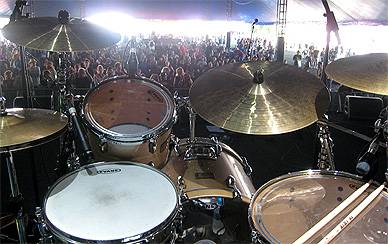Yes, drumming is a lot of fun. But beyond that, it can also improve your health. And your finances.
How? Here are 6 health and 1 money benefits of playing the drums…
1. Makes you fit
Have you ever tried to produce 232 strokes with your right hand, 29 with your left and 29 with your right foot on a pedal – all at the same time?
That’s what you do while playing a standard 4/4 groove in an average tempo (116 bpm) on the drums – within one minute.
So it’s no wonder that British researchers found that the heart rate of Clem Burke, drummer of the rock band Blondie, averages 140-150 beats per minute during a concert. That’s like the heart rate of LeBron James throughout an NBA match.
Burke also burned 600 calories per gig, and the guys over at Livestrong found that even a hobby drummer of 185 pounds burns around 272 calories during an hour-long drumming session.
So drumming is a workout. Dave Grohl, the Foo Fighter’s frontman who used to drum for Nirvana, can attest to this.

Interested in a drumming / play along / workout plan? It’s right here.
2. Increases Intelligence
Yes, drummers are probably the most joked-about species in the world of music. Or didn’t you know this one:
What do you call a drummer with half a brain?
Gifted.
Yet, I’m begging to suspect that those who make the jokes are actually only jealous. After all, Swedish researchers asked people to keep the time with a drum stick before taking an intelligence test and…
…those who scored highest on the test also had done best in the time-keeping exercise. Rhythm and brain go together you jokers!
So perhaps it’s no coincidence that drumming star Jojo Mayer can not only play but also speak at a TED event.
3. Makes you happy
Do you know that amazing feeling after an intense workout? A clear mind and everything moving harmoniously within the body? And even if you don’t…
…this state is no longer reserved to runners, athletes and fitness people, because University of Oxford psychologists have shown that drumming produces a similar rush of endorphins (“the happiness hormone”).
So “Drummer’s high” is the new “runner’s high”. Steve Moore, aka “the mad drummer” knows this and is not afraid to let it show (note his face at 0:36)…
4. Reduces pain
Approximately twelve years ago I was sitting in the audience of a concert and I couldn’t believe my eyes when a seemingly ancient man walked up on stage on crutches, sat down behind the drums and started playing like he was 30 again.
This must have been another side-effect of the fact that drumming produces endorphins, and these hormones also function as the body’s morphine-like painkiller. So drumming can actually help reduce chronic pain.
I don’t have it on video, but imagine it something like this:
https://www.youtube.com/watch?v=146kfh9ANXc
5. Helps you concentrate or relax
Do you know when you’re trying to relax after a busy day at work but your thoughts are racing in circles?
Stanford researchers would probably tell you to get some grooves going. After all we’ve learned to find safety in our mother’s heart beat before we are even born.
So, their studies found that beats will cause our brainwaves to start resonating with the rhythm. Slow ones will make you all meditative and calm, and a fast beat will make you alert and help you concentrate.
A psychologist at the University of Texas found that exposure to fast beats can even increase the concentration of children with Attention Deficit Disorder – just as much as Ritalin and other medication does.
Try reading the rest of this article to this music:
6. Helps develop confidence
Are you unsure of your capabilities at times? Then try taking responsibility for keeping the time – the most essential element – in a band. If the drummer sucks, the band will suck. So here’s something to prove yourself.
And if you keep at it, you will discover that you can be a band’s solid foundation. You can be their heart beat. All while being watched by an audience who likes and respects what you’re doing. To me this is an enormous boost in self-confidence every time.

7. Can make you money
Beyond all the mental and physical health benefits of being a drummer, there’s one more good reason:
Once you’re fairly good, you can make decent money helping others get into drumming – and without the need to go to music school or have a certificate first.
Yes, there are drum schools where you need formal qualifications. But there will be many more “private” drum teachers around your corner who teach drums just because they know how to do it and people pay them for it.
And the nice thing is: you’re your own boss. You can pick the times and set your rates – and those can be quite decent moreover (I’m charging 20$ for 45 minutes and that is pretty low).
Interested but don’t know where to start?
Get behind a drum set. That’s the only way of finding out if drumming is for you or not.
Either go to your local drum store and try out a few kits – the shop assistants will be happy to help you.
Or if you’ve already decided that you want your own drum set, you can get one that isn’t expensive (around 250$) and decent quality at the same time. For recommendations, you can check out my best beginner drum set review. Or if you’re more of an electronic drummer, you can read about the best electronic drum sets too.
Want More Benefits?
Check out this cool infographic showing 10 benefits of drumming.
And also let me know: what are your experiences with drumming so far?
Have you heard of / witnessed / experienced some other benefits? I’d love to read your comments.
Really like this! I have been a drummer for many years, but went through a period of concentrating on Guitars. Now I am back with my old band from many years ago, and got another drum kit. We are having a BLAST. I have to travel there but that is part of the fun of it. We play and record on a Tascam about 5 times a year.
I love reading up on my hobbies. Thanks for providing.
Thank you very much Bill! Good luck for and lots of fun with your band!
I’ve been thinking about picking up the drums just for fun but I had no idea there were so many other benefits to learning them. I like that you mention how studies have shown that beats help us relax or concentrate. This sounds like a great way to help me fall asleep before bed. Thanks for sharing!
Thanks Derek. I’m honored!
Such a great work man thank you for all these information
Thank you very much, Deniz! It’s my pleasure!
Good stuff. Thanks. More pro-drum propaganda is needed, especially in my house, where I sometimes have to convince my wife that drums are an actual musical instrument and deserve as much respect as that crappy out-of-tune piano collecting dust at her brother’s house.
Haha, Don! I couldn’t agree more! Let’s tell the world…